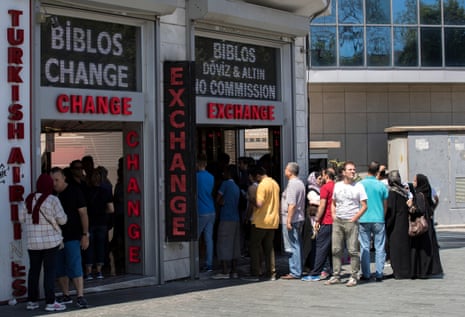President Recep Tayyip Erdoğan’s bizarre utterances about “an operation against Turkey” run by shadowy “interest-rate lobbies” and “bullies of the global system” cannot hide the fact his own policies are behind the lira’s precipitous slide. It’s true that a strange spat over a detained American pastor was used as a pretext by the Trump administration to impose punitive tariffs on Turkish steel and aluminium imports. This contributed to turning the lira’s disorderly retreat on the markets into a chaotic rout. But Turkey’s crisis was made at home.
The problem for Erdoğanomics is that it relies not on facts but on a misplaced belief in the president’s personality to win arguments. Since 2016, Mr Erdoğan has pursued a policy that favoured cheap credit and high growth over high prices. On the surface, this has yielded success: Turkey’s real GDP has grown by more than a third over the past five years – just behind China and India. Despite high inflation, the credit binge made consumers feel rich – helping secure Mr Erdoğan the newly created post of all-powerful president. Yet the Turkish strongman has traded his nation’s sovereignty in this dash for growth. Under his rule, Turkish banks and companies racked up debt denominated in US dollars. They could do so because central banks around the world were pumping money to stimulate their economies after the global financial crisis.
That borrowing, which fuelled consumption and spending, resulted in Turkey running a large current account deficit. The government also ran a fiscal deficit. When the lira plunged, Turkey’s private sector found its borrowing costs, denominated in foreign currency, rose sharply. Had Mr Erdoğan thought through the ramifications of his ultra-loose policy, he would have put money aside to deal with foreseeable crises. This would have meant accumulating enough foreign exchange reserves to meet all repayments, and interest on foreign debt falling over the next year. Turkey would need about $180bn. Instead Mr Erdoğan has less than half of that and a crisis he cannot pay for.
The ruining of Turkey, a Nato member, would have major implications for the Middle East and Europe. Not only do Nato jets use Turkish bases to fight Islamic State, but the EU pays Ankara billions of euros to hold back the tide of Syrian migrants. Mr Erdoğan wrote in the New York Times after Mr Trump’s actions to warn the west its partnership “could be in jeopardy”. Turkey has alternatives, he said, presumably referring to the autocratic regimes of Russia and China. However neither could organise a bailout big enough.
This is an emergency in the real economy: Turkey is almost wholly reliant on crude oil imports and because of the lira’s decline the black stuff is twice as expensive now as it has ever been. The question is how to recover the loss of confidence in the functioning of its economic system.
Mr Erdoğan’s emergency measures are unlikely to be enough. He could do nothing, but that is asking for trouble, especially from foreign creditors. He’s not likely to run to the IMF for a loan.
More plausibly, economic reality will dawn on Mr Erdoğan. Abjuring religious concerns about usury, Turkey’s central bank will probably raise interest rates sharply. This would bring the economy to a shuddering halt and lead to widespread unemployment. Mr Erdoğan has spent years prioritising popularity over economic stability. In reversing course, the Turkish president will have to own the turmoil he has created.
